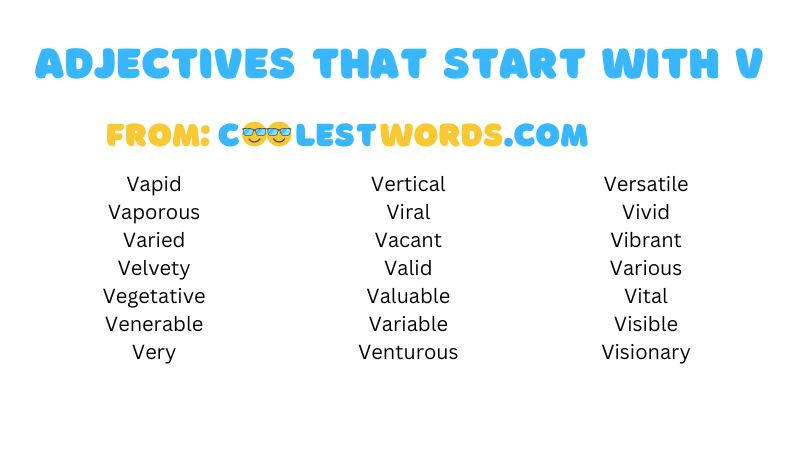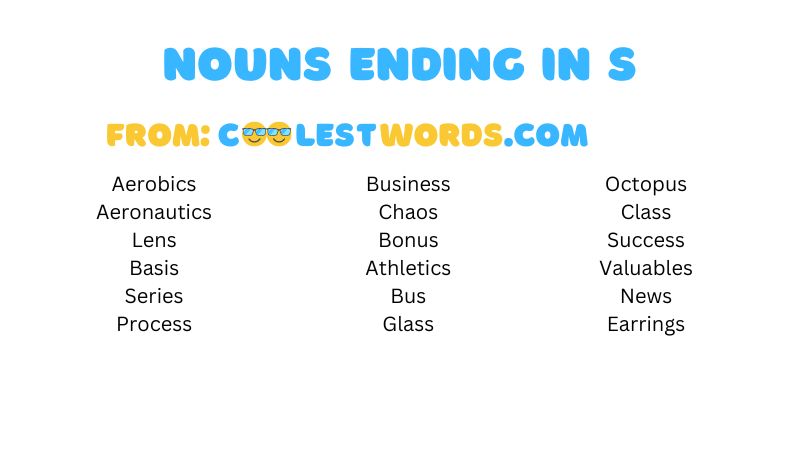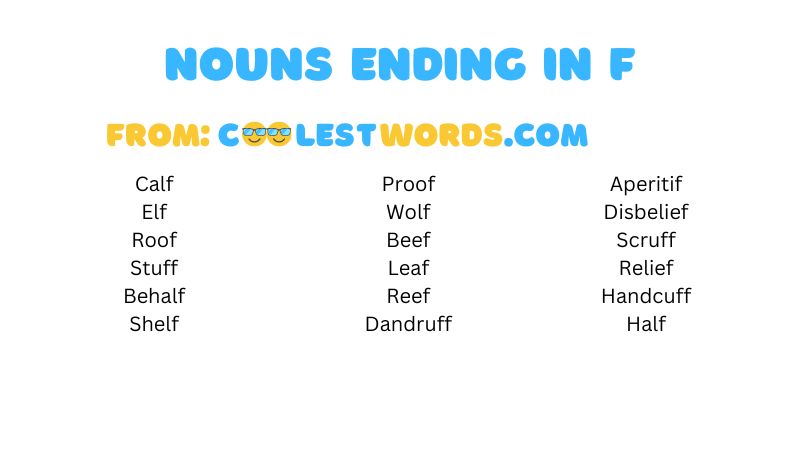Language constantly evolves, shaped by culture, history, and the human experience.
Adjectives, as one of the fundamental building blocks of language, play a crucial role in this evolution, reflecting society’s changing values, beliefs, and perspectives.
Therefore, this article will focus on a subset of adjectives beginning with the letter “v.”
The Most Common Adjectives That Start With The Letter V
Vacant
“Vacant” is an adjective that means empty, unoccupied, or not in use.
It describes a space, a building, or a job position that is available or without an occupant.
“Vacant” can relate to a state of mind or a feeling of emptiness or detachment.
For example, someone who feels numb or disengaged might be described as having a vacant demeanor or expression.
Another use of “vacant” is to describe a position or title that is not currently filled or occupied. For instance, this could refer to a job vacancy or a vacant seat on a board of directors.
In some contexts, “vacant” can imply a sense of loneliness or isolation.
For example, a “vacant house” might suggest a sense of abandonment or neglect, while a “vacant stare” could convey a feeling of disconnection or alienation.
Finally, “vacant” can be used metaphorically to describe a lack of substance or purpose.
For example, someone who makes empty promises or engages in meaningless activities might be described as having a vacant life or existence.
Valid
“Valid” is an adjective that means true, accurate, or legally binding. It refers to an argument, point of view, or statement based on sound reasoning, evidence, or logic.
For example, “Her argument is valid because it is supported by data and research,” or “The contract is valid and enforceable under the law.”
In addition to its use in logical or legal contexts, “valid” might be used more broadly to describe something reasonable, justified, or appropriate.
For example, “His concerns are valid and should be taken seriously,” or “This criticism is valid and worth considering.”
In general, “valid” is an adjective that conveys the idea of legitimacy or authority, whether in a logical, legal, or social context.
Valuable
“Valuable” is an adjective that means something has great worth or importance.
It describes a person, object, or idea considered of high quality or significance.
For example, “Her expertise and experience make her a valuable team member,” or “This antique vase is a valuable addition to my collection.”
“Valuable” can refer to something beneficial, such as a skill or resource.
For instance, “Learning a foreign language is a valuable asset in today’s global economy,” or “The company’s data analytics is a valuable tool for understanding customer behavior.”
Variable
“Variable” is an adjective that means something is subject to change or variation.
It describes a factor or element that is not constant but varies or fluctuates depending on different conditions or circumstances.
For example, “The weather is variable this time of year, with sudden changes in temperature and precipitation,” or “The study found a significant variable in the results, which could impact future research.”
In addition to its use in scientific or mathematical contexts, “variable” can be used more broadly to describe people, situations, or emotions subject to change.
For instance, “Her moods are variable and unpredictable, making it hard to know how she will react.”
Venturous
“Venturous” is an adjective that means being daring, courageous, or willing to take risks.
It can describe a person or an action that involves taking chances or being adventurous.
For example, “She was a venturous traveler who explored remote parts of the world,” or “The startup company was founded by a group of venturous entrepreneurs who were willing to take risks to pursue their vision.”
“Venturous” also describes an idea or plan that is bold or ambitious or a decision that requires courage or boldness.
For instance, “The artist’s venturous approach to painting broke new ground in the art world,” or “The company’s venturous strategy paid off in the long run, despite initial setbacks.”
Versatile
Versatile is an adjective that describes the ability of someone or something to adapt or be used in many different ways or for many other purposes.
It implies flexibility, resourcefulness, and the capacity to perform various tasks or functions.
For example, a versatile actor can play various roles, a versatile tool can be used for multiple purposes, and a versatile athlete can compete in different sports or events.
The term can describe people, objects, skills, or abilities that have a broad range of applications or can be applied to various situations.
Vivid
“Vivid” is an adjective that means something is obvious, bright, or detailed, often with a strong sense of color or imagery.
It describes a memory, a description, or a scene that is very lifelike and realistic.
For example, “She had a vivid memory of the day she met her best friend,” or “The painting was so vivid that it almost looked like a photograph.”
In addition to its use in describing visual details, “vivid” can express emotions or experiences that are intense and deeply felt.
For instance, “The singer’s performance was so vivid that it moved many audience members to tears,” or “The book provides a vivid account of the protagonist’s struggles with addiction.”
Vibrant
Vibrant is an adjective that describes something lively, bright, and energetic.
It suggests a sense of vitality, excitement, and enthusiasm.
Vibrant colors are bold, rich, and intense, while vibrant music is lively, dynamic, and upbeat.
A vibrant community is bustling with activity, culture, and diversity, while a vibrant personality exudes confidence, energy, and passion.
It describes many things, from art and culture to people and places.
Something vibrant is full of life, movement, and vitality, often inspiring joy, enthusiasm, and positivity.
Violent
“Violent” is an adjective describing something characterized by physical force or aggression that causes harm or damage.
It can describe a person, action, or event that involves the use of force or violence.
For example, “The protesters engaged in violent clashes with the police.”
“Violent” also describes intense or extreme emotions, such as anger, hatred, or passion.
For instance, “He has a violent temper that often leads to outbursts,” or “The debate sparked a violent response from both sides of the political spectrum.”
Vital
The term “vital” refers to something essential or critical to the existence or well-being of a person, organism, system, or thing.
It implies that without this particular element, the entity in question would not be able to function or survive.
For example, vital organs in the human body, such as the heart, lungs, and brain, are crucial to sustaining life.
In contrast, vital nutrients such as vitamins and minerals are necessary for maintaining good health.
In a broader context, the term can also refer to essential or indispensable aspects of society, culture, or the environment.
Visible
“Visible” refers to something that can be seen or perceived with the naked eye or through technology such as a microscope or telescope.
It implies that the object or phenomenon is observable or apparent to the senses or instruments.
In a literal sense, the term can refer to objects that are physically present and within the range of one’s vision, such as a visible horizon, a visible wound on the skin, or visible stars in the night sky.
It also refers to discernible or distinguishable things, such as visible patterns in a carpet or symptoms of a disease.
In a figurative sense, the term describes ideas or concepts that are easily understood or apparent, such as visible progress in a project, differences between two products, or visible trends in a market.
Visionary
The adjective “visionary” describes something or someone with a forward-thinking, innovative, and imaginative perspective on the future.
It can refer to ideas, concepts, or plans that are unconventional or original and can potentially transform a particular field or industry.
For example, a visionary project might aim to revolutionize transportation, energy production, or healthcare, or a visionary artist might be one who creates groundbreaking works that challenge traditional notions of art and beauty.
The term can describe someone with exceptional creativity and a powerful imagination, often resulting in unique and unconventional ideas.
A visionary leader might have a clear and inspiring vision for the future and can motivate others to work towards achieving that vision.
In general, the term “visionary” suggests an ability to think beyond the present and envision a radically different future from the status quo, often to bring about positive change or progress.
Volcanic
The term “volcanic” refers to something related to or formed by volcanoes, openings in the Earth’s crust that allow molten rock, ash, and gases to escape from the planet’s interior.
In a literal sense, the term can describe geological features or phenomena associated with volcanic activity, such as volcanic eruptions, lava flows, volcanic ash, and volcanic rocks.
It refers to landscapes or regions shaped by volcanic activity, such as volcanic islands, volcanic plateaus, or volcanic cones.
In a figurative sense, the term can describe intense or explosive emotions or behavior, such as a “volcanic temper” or a “volcanic outburst.”
It also represents something extremely active, energetic, or consequential, such as a “volcanic market” or a “volcanic performance.”
Various
“Various” is an adjective used to describe a collection of different or diverse things or people.
It implies that a range of choices or options is available and that each item in the collection has distinct characteristics or qualities.
For example, a store might offer a “various selection of fruits” that includes apples, bananas, oranges, and grapes.
A person might have “various interests, ” including reading, sports, and music.
A group might come from “various backgrounds,” including different cultures, nationalities, or professions.
The term “various” suggests a lack of homogeneity or uniformity and instead emphasizes the diversity or multiplicity of the collection.
It is often used to provide a general description of something without going into detail about each individual item or aspect.
Voluntary
The term “voluntary” is an adjective that refers to something that is done, given, or undertaken by choice or free will without coercion or obligation.
For example, a “voluntary donation” is given freely without expecting reward or recognition.
A “voluntary organization” is established and run by people who choose to participate rather than by the government or other outside forces.
A “voluntary service” is performed without pay or compensation, often as a form of community service or activism.
Virtuous
The term “virtuous” is an adjective that describes a person or action that is morally good, upright, and righteous.
It implies that the person or activity is characterized by honesty, integrity, courage, kindness, and generosity and that they adhere to ethical principles and values.
For example, a “virtuous person” lives according to a set of moral principles and values and strives to do what is right and good, even when difficult or unpopular.
A “virtuous act” is an action that is done with good intentions and is considered to be morally right or just.
Finally, a “virtuous circle” is a positive feedback loop in which one positive action or outcome leads to another, creating a cycle of positive reinforcement.

More Adjectives That Start With V
Vapid
Vaporous
Varied
Velvety
Vegetative
Venerable
Very
Vertical
Viral
Similar content:



